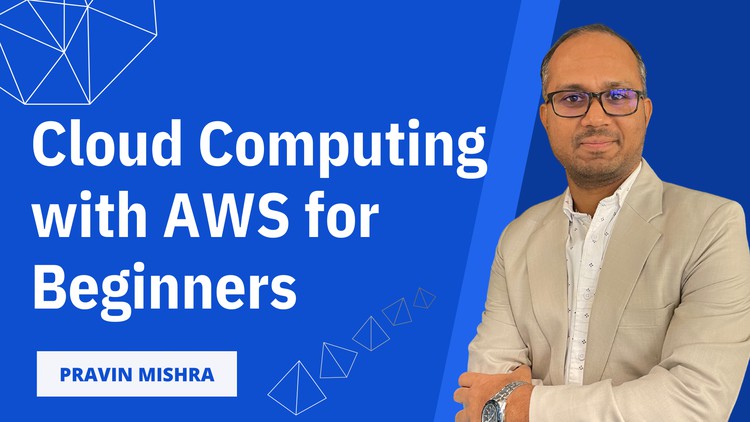Cloud Computing with AWS for Beginners
Cloud Computing with AWS for Beginners
Learn fundamentals of Cloud Computing, Amazon Web Services (AWS), its core services
FREE For Limited Enrolls
https://www.udemy.com/course/cloud-computing-with-aws/?couponCode=93D53FF8A9480227E524
- Do you prefer a simplified and easy-to-understand approach to learning complex concepts, rather than being overwhelmed with excessive content?
- Are you new to cloud computing or looking to refresh your knowledge on the basics of AWS and its core services?
- Are you seeking a course that requires no prior tech or cloud background, making it accessible for individuals from various backgrounds and skill levels?
- Is your goal to gain a solid foundation in AWS and cloud computing, enabling you to explore more advanced topics and potentially switch careers in the future?
If the answer to any of the above questions is YES, then this course is for you.
As the name itself suggests, this Cloud Computing with AWS for Beginners course will get you started with cloud computing and AWS. Don’t know anything about cloud computing?! Well! No worries, this course will take you from the absolute ground up to understand how AWS core services work. This course is ideal for beginners who want to learn AWS and intermediates looking to refresh their cloud computing knowledge. No tech or cloud background is required!
The course has engaging videos to make complex concepts very easy to understand followed by simple and step-by-step demos at the end to help you understand the working of core services. All the services and resources taught in this course fall under the AWS Free Tier, so if you follow the guidelines in the course, you will not have to pay anything to AWS in order to learn from this course.
Upon successful completion of this course:
- You will have a thorough understanding of cloud computing, its key concepts, and benefits.
- You will be able to decide when to use cloud computing and which models and services you should employ.
- You will be able to create your AWS account and be able to secure it with the right services..
- You will have an understanding of your AWS account, the free tier and different ways to access your account.
- You will be able to use IAM service to monitor and control the access on your account. And you will have an understanding of IAM policies and IAM best practices.
- You will be able to use the S3 for the storage of your data.
- You will be able create an S3 bucket.
- You will have a good understanding of AWS storage classes to store your data efficiently and economically based on how frequent you access your data.
- You will have a complete understanding of networking in AWS also known as Virtual Private Cloud (VPC) and how to create private and public subnets.
- You will know how the public and private subnets work in VPC and how the internet gateway connects a VPC with the internet.
- You will also learn how to use Security groups and NACL to control traffic to and from resources in a VPC.
- You will be able to classify the compute services in AWS and understand their uses.
- You will understand the concept of virtual machines in the cloud computing aspect.
- You will be able to choose the right compute service for your requirement.
- You will be familiar with Elastic Compute Cloud (EC2) and its features. And you will be able to launch EC2 instances through the AWS management console.
- You will understand how the load balancer distributes the traffic to EC2 instances and monitors the health of EC2 instances.
- You will know how Elastic Load Balancer (ELB) enables the load balancer to handle the additional load without any change.
- You will also understand auto-scaling, auto-scaling groups and their policies to scale up according to the requirements.
- You will be able to understand which type of data you have and where you should store it.
- You will be able to use relational databases for your data.
- You will be able to understand non-relational databases to store semistructured data and unstructured data.
- You will learn how to manage databases in your on-premise data centers.
- You will be able to set up, operate and scale a relational database in the cloud.
- You will understand DynamoDB, its flexible data model, and its applications in gaming and IoT.
All in all, we are covering all the essential aspects of Cloud Computing, so If you are looking for a shorter and more comprehensive course to start your journey with the cloud, this is the course for you! I hope to see you in the course.

Comments
Post a Comment